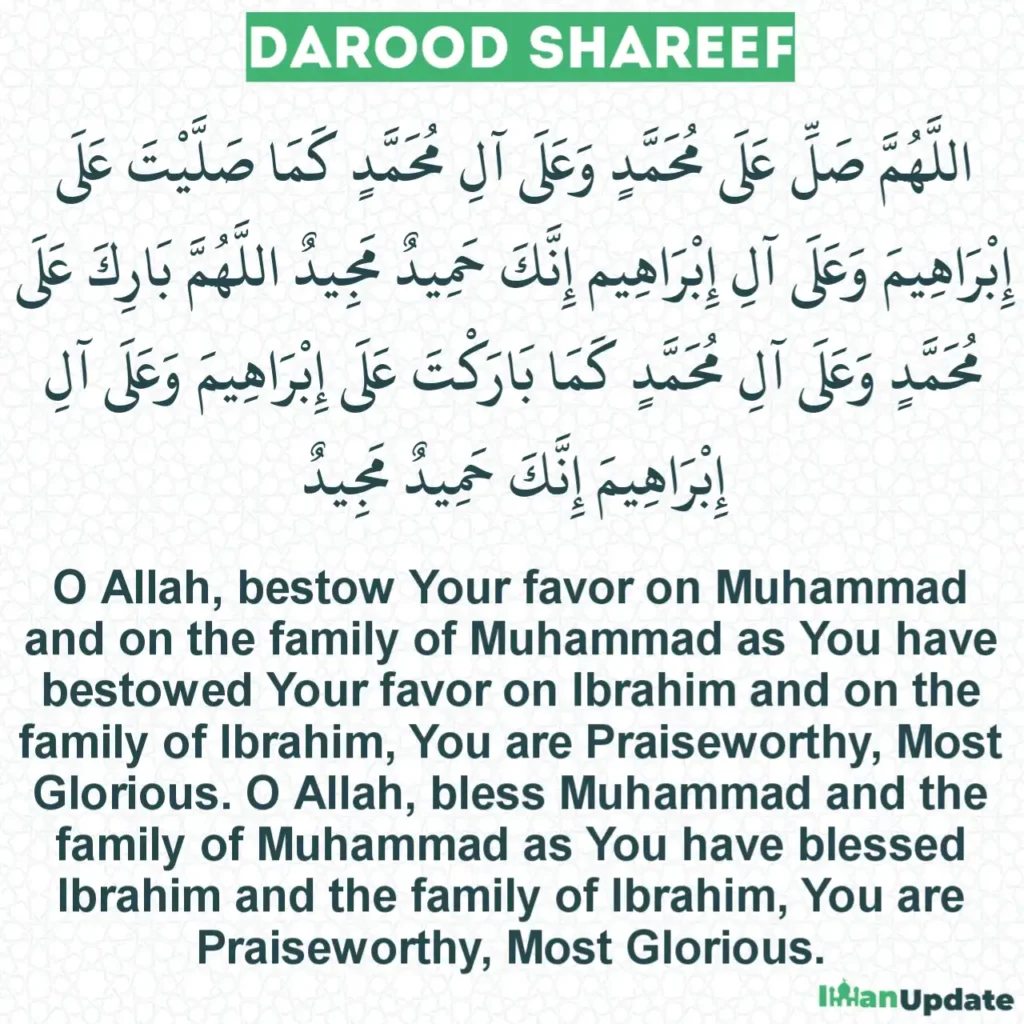Darood Sharif in Arabic, Transliteration and English

Darood Sharif is a significant phrase in Islam, representing the act of sending salutations and blessings upon the Prophet Muhammad (peace and blessings be upon him).
Also referred to as Salawat in Arabic, Darood Sharif holds a special place in Islamic teachings, as it reflects the deep reverence Muslims hold for the Prophet.
In this post, we will explore the meaning of Darood Sharif, its transliteration, its English translation, and the immense benefits associated with its recitation.
What is Darood Sharif?
The term “Darood Sharif” is commonly used in the South Asian context to refer to sending blessings and salutations upon the Prophet Muhammad (peace be upon him).
However, it’s important to note that “Darood” itself is not an Arabic word. The more accurate Arabic term is Salawat (plural) or Salat (singular), which refers to sending blessings and peace upon the Prophet.
This act is deeply rooted in Islamic Shari’ah and is considered a noble form of worship that connects believers to Allah and His Messenger.
Reciting Darood Sharif, or sending blessings upon the Prophet, is an act highly encouraged in Islam. It is one of the greatest ways to show love, respect, and veneration for the Prophet Muhammad (peace be upon him).
Moreover, this act is beneficial for Muslims both in this world and the hereafter, bringing numerous rewards and blessings into their lives.
Why Is Darood Sharif Important?
Sending blessings upon the Prophet Muhammad (peace and blessings be upon him) is an essential component of loving and respecting him as the final messenger of Allah.
It is a way of acknowledging the immense role he played in delivering the message of Islam to humanity. By sending Salat and Salam (peace) upon him, we fulfill one of the Prophet’s rights upon the Ummah (the global Muslim community).
Allah Himself commands this act in the Quran, where He says (interpretation of the meaning):
““Allah sends His Salat (Graces, Honours, Blessings, Mercy, etc.) on the Prophet (Muhammad SAW) and also His angels too (ask Allah to bless and forgive him). O you who believe! Send your Salat on (ask Allah to bless) him (Muhammad SAW), and (you should) greet (salute) him with the Islamic way of greeting (salutation i.e. As-Salamu Alaikum)” (Al-Ahzaab 33:56).
This verse emphasizes the significance of sending both blessings and salutations upon the Prophet.
READ ALSO: Sayyidul Istighfar Dua: The Master of Seeking Forgiveness
The Different Forms of Darood Sharif
There are various forms of sending blessings upon the Prophet Muhammad (peace be upon him), with some of the most well-known being Salatul Ibrahimiyya.
The Prophet himself taught his companions different ways to send these blessings, ensuring they would remain a part of the Muslim Sunnah (tradition).
In the book Sifat Salaat an-Nabi by the renowned scholar Al-‘Allaamah Al-Albaani (may Allah have mercy on him), various authentic ways of sending Darood Sharif are documented, offering believers a guide on how to fulfill this act of worship.
The two most well-known versions of Darood Sharif that the Prophet (peace and blessings be upon him) taught his companions are as follows:
Darood Sharif in Arabic
اللَّهُمَّ صَلِّ عَلَى مُحَمَّدٍ وَعَلَى آلِ مُحَمَّدٍ كَمَا صَلَّيْتَ عَلَى إِبْرَاهِيمَ وَعَلَى آلِ إِبْرَاهِيم إِنَّكَ حَمِيدٌ مَجِيدٌ اللَّهُمَّ بَارِكَ عَلَى مُحَمَّدٍ وَعَلَى آلِ مُحَمَّدٍ كَمَا بَارَكْتَ عَلَى إِبْرَاهِيمَ وَعَلَى آلِ إِبْرَاهِيمَ إِنَّكَ حَمِيدٌ مَجِيدٌ
Transliteration
The transliteration is Allaahumma salli ‘ala Muhammad wa ‘ala aali Muhammad kama salayta ‘ala Ibraaheem wa ‘ala aali Ibraaheem, innaka hameedun majeed. Allaahumma baarik ‘ala Muhammad wa ‘ala aali Muhammad kama baarakta ‘ala Ibraaheem wa ‘ala aali Ibraaheem, innaka hameedun majeed.
Translation in English
O Allah, bestow Your favor on Muhammad and on the family of Muhammad as You have bestowed Your favor on Ibrahim and on the family of Ibrahim, You are Praiseworthy, Most Glorious. O Allah, bless Muhammad and the family of Muhammad as You have blessed Ibrahim and the family of Ibrahim, You are Praiseworthy, Most Glorious.
This form of Darood is commonly recited in Salah (prayer) after Tashahhud and is one of the most frequently used versions worldwide.

Durood Shariff In Arabic
اللَّهُمَّ صَلِّ عَلَى مُحَمَّدٍ وَعَلَى أَزْوَاجِهِ وَذُرِّيَّتِهِ، كَمَا صَلَّيْتَ عَلَى آلِ إِبْرَاهِيمَ. وَبَارِكْ عَلَى مُحَمَّدٍ وَعَلَى أَزْواجِهِ وَذُرِّيَّتِهِ، كَمَا بَارَكْتَ عَلَى آلِ إِبْرَاهِيمَ. إِنَّكَ حَمِيدٌ مَجِيدٌ
Transliteration
Allaahumma salli ‘ala Muhammadin wa ‘ala azwaajihi wa dhurriyyatihi kama salayta ‘ala Ibraaheem, wa baarik ‘ala Muhammadin wa ‘ala azwaajihi wa dhurriyyatihi kama baarakta ‘ala aali Ibraaheem, innaka hameedun majeed.
Meaning in English
O Allaah, send Your salaah (grace, honour and mercy) upon Muhammad and upon his wives and offspring, as You sent Your salaah upon Ibraaheem, and send Your blessings upon Muhammad and upon his wives and offspring, as You sent Your blessings upon the family of Ibraaheem. You are indeed Praiseworthy, Most Glorious).”
Narrated by al-Bukhaari and Muslim (407) from the hadeeth of Abu Humayd as-Saa‘idi (may Allah be pleased with him).
Shorter Versions of Darood Sharif
Apart from the more detailed versions, there are shorter versions of Darood Sharif that are recited outside of formal prayers. These include:
- اللهم صل على محمد وآل محمد
Transliteration: Allaahumma salli ‘ala Muhammad wa aali Muhammad
Meaning: “O Allah, send blessings upon Muhammad and the family of Muhammad.” - صلى الله عليه وسلم
Transliteration: Sall-Allahu ‘alayhi wa sallam
Meaning: “May Allah send blessings and peace upon him (the Prophet).”
The use of such brief versions is valid and carries immense rewards, as the essence of the action—sending blessings upon the Prophet—is fulfilled.
Benefits of Reciting Darood Sharif
The recitation of Darood Sharif holds numerous spiritual and worldly benefits. Some of these include:
- Following Allah’s command: Reciting Darood is in direct obedience to the Quranic command in Surah Al-Ahzaab (33:56).
- Receiving Allah’s mercy: Every time a believer sends blessings upon the Prophet, they receive multiple blessings from Allah in return.
- Erasing sins: It is said that for every Darood recited, ten sins are erased, ten good deeds are written, and ten levels are elevated.
- Intercession on the Day of Judgment: The Prophet (peace be upon him) will intercede for those who regularly send Darood upon him.
- Closeness to the Prophet: Those who consistently send blessings upon the Prophet will be near him on the Day of Judgment.
Importance of Varying the Darood
It is recommended to recite different versions of Darood to follow the Sunnah completely and to prevent the neglect of other forms. Varying the recitation also ensures that believers fulfill the practice in its entirety, following the example of the Prophet. However, scholars caution against combining different versions into one as it may deviate from the Sunnah.
Conclusion
Darood Sharif is an essential part of a Muslim’s worship, reflecting their love and respect for the Prophet Muhammad (peace and blessings be upon him).
Whether in long or short form, sending blessings upon the Prophet carries immense rewards in this life and the next. By regularly reciting Darood, Muslims not only fulfill a divine command but also draw closer to Allah and His Messenger.
Reciting Darood should become a daily practice for every Muslim, as it is a source of countless blessings and a reflection of our connection to the Prophet Muhammad (peace and blessings be upon him).






